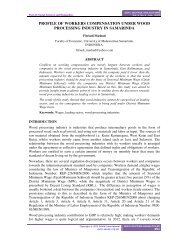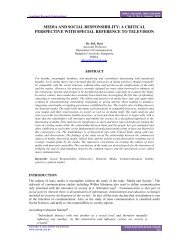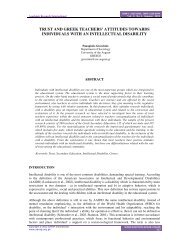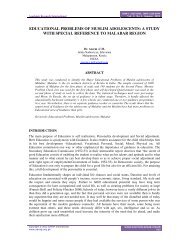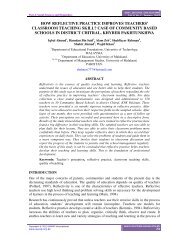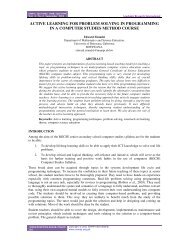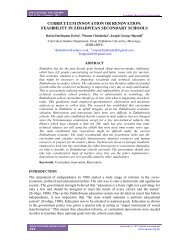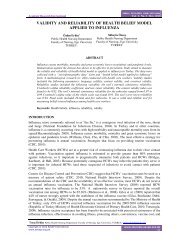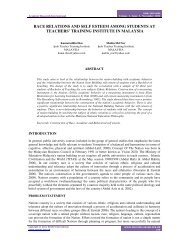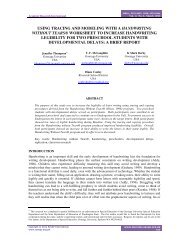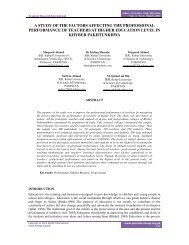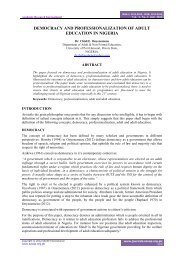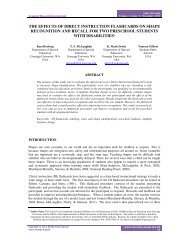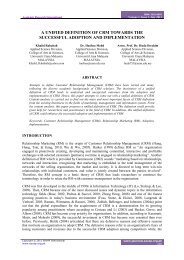Vol. 1(2) SEP 2011 - SAVAP International
Vol. 1(2) SEP 2011 - SAVAP International
Vol. 1(2) SEP 2011 - SAVAP International
You also want an ePaper? Increase the reach of your titles
YUMPU automatically turns print PDFs into web optimized ePapers that Google loves.
Academic Research <strong>International</strong><br />
ISSN: 2223-9553<br />
<strong>Vol</strong>ume 1, Issue 2, September <strong>2011</strong><br />
Ironically, it is very pitiable to state that majority of women are not aware and that the men that know<br />
about the existence of this, Endeavour to keep it eternally secret. Another discriminatory practice<br />
whereby a woman has any opportunity to travel outside her country and she is mandated to provide an<br />
authority/ permission evidence from her husband. However, this is fast going out of fad; as an<br />
influential woman who almost lost an opportunity to travel abroad for a business opportunity fought<br />
this practice to a halt.<br />
Another consequence of stratification by gender is low self image. The women in this region of the<br />
world are denied certain opportunities; such as taking arrested people on bail, even though in Nigeria<br />
the law is to the contrary, the woman is also denied opportunity to obtain bank loans under the guise<br />
of providing collateral despite the fact that those establishments that make such demands are aware<br />
that women are not entitled to own landed property in their communities. This actual denial of certain<br />
rights of women by the society brings about low self image of women and this low self image makes<br />
most women timid. It this observed timidity which makes some to engage in anti-social behaviors<br />
some of which are; prostitution, gossips and the other majority become steady and regular faces in<br />
churches which also is a means of cushioning the effect of self image problem (deficit).<br />
Furthermore, is the issue of low output. This is common especially as the labour of women are not<br />
quantified and priced. Therefore, the amount of time women spend on family care is not considered<br />
economically which is why no member of the society takes the women of wealth into consideration<br />
when families are ranked socially by wealth. Under the given circumstance, most women hand over<br />
whatever wealth they have accumulated to their husbands including land bequeathed to them as<br />
dowry during weddings. On the other hand, some women hand over money and property to their<br />
brothers who use such wealth to update their individual families and thereby receive societal<br />
approval; while the women are viewed as never do wells. This experience is totally contrary to what<br />
Farnham (1997:47); as gender equality in European society where men and women discuss and<br />
manage whatever resources that are at their disposal.<br />
To climax these consequences is the health aspect of the women. Due to how the society views and<br />
treats women some of them present with what Wheaton in (Eaton 2000 :191) calls fatalism. Fatalism<br />
is a situation where external factors in the environment make the women vulnerable to psychological<br />
disorders. A woman is forbidden to complain aloud if she experiences difficulties with either her<br />
spouse or male siblings; she cannot decide or determine the number of children she should have, nor<br />
speak out if raped. Low and behold, the bottled up emotions over a long period manifest as mental<br />
disorders of varying magnitude of which she may not be given the opportunity of early or no medical<br />
attention. To add credence to this phenomenon is (Brown and Harris 1978:150) who state that there is<br />
evidence of a relationship of life event stressors to depression. Also to support this trend is (Brown, et<br />
al 1975:78) who account that there is evidence of a social class to depression. The foregoing<br />
statements confirm the fact that, some women present with depression as health malady, which occurs<br />
as a result of the position they occupy in the social world (family, office etc).<br />
The most unappealable of stratification is discrimination and oppression. In societies where<br />
stratification is emphasized based on gender, it is observed that the women are discriminated and<br />
oppressed everywhere- whether in their homes, social organizations and not excluding religious<br />
settings. That is why, in every know society, women are expected to behave, talk and think in certain<br />
way. Therefore, females must dress in feminine forms which may include covering of the entire bodyas<br />
their bodies are for their husbands exclusively; or the exposure of majority of their bodies which its<br />
main aim is to attract men to them. They also must cover their heads in religious places and town halls<br />
which are evidence of submissiveness. Again, they cannot independently express their feelings where<br />
people are gathered; nonetheless, if it becomes imperative for them to do so at all, such presentations<br />
must be through a male representative, no matter how young or inconsequential the male may be. The<br />
females as matter of tradition are the ones to care for children and to perform every known household<br />
chores. Anything to the contrary puts the woman in a bad light and she can be addressed in either of<br />
these repugnant names – macho-woman, wild woman and in native parlance as ‘Owaruanya’. This<br />
Copyright © <strong>2011</strong> <strong>SAVAP</strong> <strong>International</strong><br />
www.savap.org.pk<br />
www.journals.savap.org.pk<br />
242



